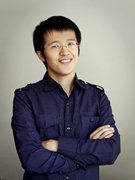个人资料
教育经历工作经历个人简介社会兼职研究方向博士后:华东师范大学教育科学学院,2011-2013 博士:匹兹堡大学物理与天文系,2007-2011 博士论文题目为“Improving Students’ Understanding of Quantum Mechanics” 本科:清华大学物理系,2003-2007
1. 主要研究内容: 1)调查学生在量子力学课程学习中普遍遇到的难点: ① 设计课堂调查问卷,对学生遇到的学习难点进行分类; ② 采用“think-aloud”的方式对学生进行一对一采访,深入了解学生的思维过程; ③ 研究过的知识点包括:量子测量,波函数,定态与本征态,物理量的平均值,时间演化,哈密顿量,狄拉克表示法,角动量,Stern-Gerlach实验等。 2)开发基于物理教育研究的量子力学辅导材料与课堂讨论题: ① 设计量子力学交互式辅导材料作为引导探究式学习材料,帮助学生建立关于量子力学的完善的知识结构; ② 按照课堂表决系统的特点,设计量子力学的概念测试题,作为引导学生讨论的同伴教学手段; ③ 根据学生和教师反馈,对上述教学辅导材料进行反复的评价和修改; ④ 围绕上述研究内容编写了上千道与量子力学概念相关的习题。 3)开发量子力学的诊断性标准化考试: ① 测试内容的确定 在开发该诊断性标准化考试过程中,对考试的合理性与可靠性进行了重点研究,通过对匹兹堡大学物理系讲授过量子力学课程的教授们的采访,确定了考试中应涉及的知识点,并设计了两套诊断性的标准化试卷 “量子力学测试(QMS)”与“量子力学表达形式测试(QMFS)” ,用以评价学生对于量子力学最基本概念和原理的理解; ② 测试结果的总结 用这两套试题对学生的学习情况进行测试,通过试卷对学生的学习难点和常见错误理解进行分类与研究。 该考试已被美国匹兹堡大学,斯坦福大学,波士顿大学,加州大学圣巴巴拉分校,纽约州立大学布法罗分校,科罗拉多大学等多所学校采用作为对学生量子力学学习情况的检测手段。 招生与培养开授课程科研项目学术成果Improving Student Understanding of Addition of Angular Momentum in Quantum Mechanics, G. Zhu and C. Singh, Physical Review Special Topics - Physics Education Research, 9, 010101, Jan 2013
Improving Students' Understanding of Quantum Measurement: I. Investigation of Difficulties, G. Zhu and C. Singh, Physical Review Special Topics - Physics Education Research, 8, 010117, April 2012.
Improving Students' Understanding of Quantum Measurement: II. Development of Research-Based Learning Tools, G. Zhu and C. Singh, Physical Review Special Topics - Physics Education Research, 8, 010118, April 2012.
Surveying Students’ Understanding of Quantum Mechanics in One Spatial Dimension, G. Zhu and C. Singh, American Journal of Physics, 80 (3), 252-259, March 2012
Improving students' understanding of quantum mechanics via Stern-Gerlach experiment, G. Zhu and C. Singh, American Journal of Physics, 79 (5), 499-507, May 2011
Students' understanding of the addition of angular momentum, C. Singh and G. Zhu, Proceedings of the Phys. Ed. Res. Conference, Omaha, NE, (S. Rebello, C. Singh, P. Engelhardt Eds.), AIP Conf. Proc., Melville, New York 1413, 355-358 (2012).
Students' difficulties with quantum measurement, G. Zhu and C. Singh, Proceedings of the Phys. Ed. Res. Conference, Omaha, NE, (S. Rebello, C. Singh, P. Engelhardt Eds.), AIP Conf. Proc., Melville, New York 1413, 387-390 (2012).
Improving Students’ Understanding of Quantum Mechanics by Using Peer Instruction Tools, C. Singh and G. Zhu, Proceedings of the Phys. Ed. Res. Conference, Omaha, NE, (S. Rebello, C. Singh, P. Engelhardt Eds.), AIP Conf. Proc., Melville, New York 1413, 77-80 (2012).
Improving Students’ Understanding of Quantum Measurement, G. Zhu and C. Singh, Proceedings of the Phys. Ed. Res. Conference, AIP Conf. Proc. Volume 1289, AIP Conf. Proc. 1289, 345-348 (2010)
Surveying Students’ Understanding of Quantum Mechanics, C. Singh and G. Zhu, Proceedings of the Phys. Ed. Res. Conference, AIP Conf. Proc. Volume 1289, 1289, 301-304 (2010)
Students' Understanding of Stern Gerlach Experiment, G. Zhu and C. Singh, Proceedings of the Phys. Ed. Res. Conference, AIP Conf. Proc. 1179, 309-312, (2009).
Cognitive Issues in Learning Advanced Physics: An Example from Quantum Mechanics, C. Singh and G. Zhu, Proceedings of the Phys. Ed. Res. Conference, AIP Conf. Proc. 1179, 63-66 (2009).
Peer Instruction for Quantum Mechanics, G. Zhu and C. Singh, APS Forum on Education Newsletter, Fall, 8-10, (2009).
荣誉及奖励 |

|
朱广天 |